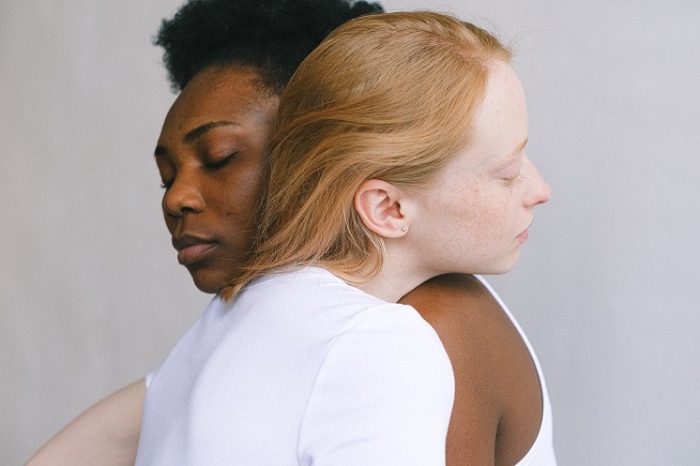This article is written in partnership with Longwalks—they’re dedicated to fostering meaningful, supportive conversations, and helping people feel connected and loved. We’re deeply honored to work with them. ~ ed.
Buddhists say loneliness is a good thing—part of our fundamental human nature.
Since no other person can ever completely understand our unique perspective or guarantee our happiness, we should rather make friends with our loneliness. Embrace it: our own raw, red heart.
By befriending loneliness, we get to know ourselves and relax into the present moment. Rather than pushing away uncomfortable emotions, we can move through them to experience the full spectrum of what it means to be human, without fear or clinging.
This is a great place to start. We can’t make real friends with others until we’ve made friends with our real selves, after all. But it’s not the whole picture.
As human beings, we need relationships with other people like we need food and shelter. We are hard-wired for connection from the time we arrive on this earth. We depend on one another for survival, and as we grow older, that doesn’t change as much as we might think it does.
It’s not lack of connection that makes us lonely, but lack of authentic connection
When I first spoke to Melody Mortazavi, who co-founded Longwalks—a free app that helps humans cut through the narcissistic noise and feedback loops of most social media and get right to the juicy heart of meaningful connection and conversation—together with Trishla Jain, one thing she said stuck out to me.
Loneliness and isolation don’t result so much from physical distance or lack of interaction, but more from the abundance of superficial day-to-day interaction.
Dr. Vivek Murthy, 19th surgeon general of the United States and author of the book, Together: The Healing Power of Human Connection in a Sometimes Lonely World, describes loneliness as what happens “when our expectations for connection and the reality of our connections don’t match up,” which echoes exactly what the folks at Longwalks are saying, and is the app’s entire raison d’être. (It’s also the best definition of loneliness I’ve ever heard.)
The app is essentially a shared journal. They provide a daily journaling prompt and a selection of conversation questions to inspire more meaningful interactions. All you need to do is bring your community of family and friends and they help you dig in and find the good stuff, the vulnerable stuff, the stuff of authentic connection.
You see, despite the relationships we may have in our lives, the problem is that too many of these relationships are not meeting our need for deep, meaningful, authentic connection.
Download Longwalks. It’s a completely free, private & no ads zone >>
You’ll be in good company:
The fact that there are three different types of loneliness can help explain why we may often feel lonely, even though we have good relationships.
The 3 types of loneliness, according to Dr. Murthy
1. Intimate/emotional loneliness: the longing for a close confidante or intimate partner, someone with whom you share a deep mutual bond of affection and trust.
2. Relational/social loneliness: the yearning for quality friendships and social companionship and support.
3. Collective loneliness: the hunger for a network or community of people who share your sense of purpose and interests.
“These three dimensions together reflect the full range of high-quality social connections that humans need in order to thrive. The lack of relationships in any of these dimensions can make us feel lonely, which helps to explain why we can have a supportive marriage yet still feel lonely for friends and community”
After learning this, I was curious to see for myself if Longwalks could help me cultivate deeper connections with people I already have a close relationship with, as well as build some bonds with those I don’t yet know as well.
The app is entirely free to download and completely private: only those you choose to connect with on the app can see what you share, and only once they themselves have shared. Since they’re entirely mission-driven, the Longwalks team is all about building community and trust. They’re not about to monetize your relationships, unlike some Zuckers out there.
The hardest part for me was convincing others to join me there since we all seem to be suspicious of yet another app to add to our ever-growing collection. But I soon found out why this assumption was wrong.
It didn’t take long for me to find myself diving into amazingly honest chats with people I thought I already knew pretty well, discovering things about even my own sister that I had spent a lifetime not knowing…all initiated by Longwalks’ simple, fun, daily-themed prompts, and guided conversations.
On Truth Tuesday, for example, Longwalks asked me to fill in the blank: “I’ve always been able to ______.” So, since it was the first thing that came to mind, I said, “stick it out through the hard stuff.” A little while later, I saw that two friends had shared their own answers and commented on mine. I could then reply in turn.
What followed was one of the most delightfully vulnerable and straight-to-the-golden-nuggets conversations I’ve had in some time. It surprised me just how well this innocuous-sounding prompt uncovered the truth we were all carrying on our hearts that day. It was refreshing and inspiring, and quite unlike any interaction I’ve had on any other social media platforms.
And when I heard a bit more of what Dr. Murthy has to say about loneliness, I understood exactly why this was.
“The foundation for connecting with other people is connecting with yourself.”
We need two things to transcend our loneliness. First, we need to understand our own unique worth, which the thought-provoking prompts on Longwalks helped me to do in an unexpectedly direct way. What did I think, feel, know about whatever came up that day? In pondering my answers on some and going with my gut response on others, I uncovered things I’d forgotten or maybe not even realized about myself.
Second, we need to be grounded in an often chaotic world. The more I used Longwalks on a daily basis, the more I was inclined to go there rather than to my Instagram feed. The big difference was that I’d come out of my time on Longwalks feeling more fulfilled and grounded than I ever had from the draining, numbing Insta scroll sessions I seem to be addicted to and dread in equal measure.
Thanks to the ubiquitous conglomeration of FacebaGramSapp (Facebook, Instagram & Whatsapp. Yes, I just made that up.) we’re more connected than ever, but less connected than ever.
We’ve heard it enough times to become pretty cliché by now, but do we really understand what this means for our well-being—as individuals, communities, and our post-liking, comments trolling, emoji-speaking society as a whole?
“Loneliness is so much more than a bad feeling. It has profound consequences for our health.”
Dr. Murthy explains that loneliness can manifest in ways we least expect it to, and even as another emotion altogether, like anger. Because of the stigma and shame around it, and the fact that it is so subjective, loneliness can be an incredibly difficult thing to identify and talk about. It tends to fly under the radar at a deep level, leading to different types of illnesses and social problems, like violence.
“Studies showed that people with strong social relationships are 50% less likely to die prematurely than people with weak social relationships. Even more strikingly…the impact from lacking social connection on reducing lifespan is equal to the risk associated with obesity, excess alcohol consumption, and a lack of exercise.”
This is pretty staggering! And it’s not just a higher risk of death. People who are lonely experience lower quality sleep, more immune system dysfunction (read that again and let it sink in), and more impulsive behavior and impaired judgment. These are definitely not things we want to be grappling with in a time of global pandemic. Current circumstances aside, it just goes to show how much more importance we really should be placing on our emotional health.
Surely, with these statistics in mind, doctors should even be screening for loneliness as much as for other health risk factors?
There’s a slow shift toward a more holistic approach, but as Dr. Murthy points out, doctors just aren’t taught this in medical school. They’re taught to focus on the physical body over our mental/emotional health.
But people-centered platforms like Longwalks may go a long way to remedying the problem in the meantime.
After trying it for a little while now, I’ve gotta say, I do believe that Longwalks is a meaningfully positive step in the direction of deeper, more fulfilling connections: a way to stay close to one another, even from afar. Based on what I’ve learned from Dr. Murthy’s work, this has a power that far exceeds the immediate impact on our individual emotional and physical health.
Meaningful connection has the power to change our society as a whole.
“When we are deeply connected to people, we are more able to listen to them, more able to give them the benefit of the doubt. That connection is what makes dialogue possible.”
This is to say that we cannot make our way toward the kinder, more compassionate, and inclusive future that many of us dream of without first figuring out how to connect with one another more meaningfully. How to have more candid, vulnerable, authentic conversations.
Relationship is the foundation of dialogue, of healing, and of a better path forward.
After using it for a little while now, I’ve moved my Longwalks icon to my home screen, where my Instagram used to be. I think that’s saying something.
Update: Longwalks has just released 4 Anti-Bias Education conversations designed specifically for this time:
1. Exploring identity: nurture your construction of self-identity and group-identity, without a sense of superiority or inferiority. Name your values with pride, and have confidence in who you are.
2. Celebrating diversity: this conversation promotes a sense of comfort, understanding, and empathy around diversity. Identify, celebrate, and learn from differences.
3. Embracing empathy: now, it’s time to listen, learn, and share. Examine what bias means to you and where it exists in your community. Engage in critical thinking together.
4. Being an ally: this series culminates with empowerment. Cultivate your ability to stand up for yourself and others in the face of bias. Make an action plan and move forward together.
Have more meaningful conversations, in a safe & private space: find out more & download Longwalks, free >>
Quotes in this article are taken from this interview on Unlocking Us, with Brené Brown, which I highly recommend you listen to.



Read 9 comments and reply